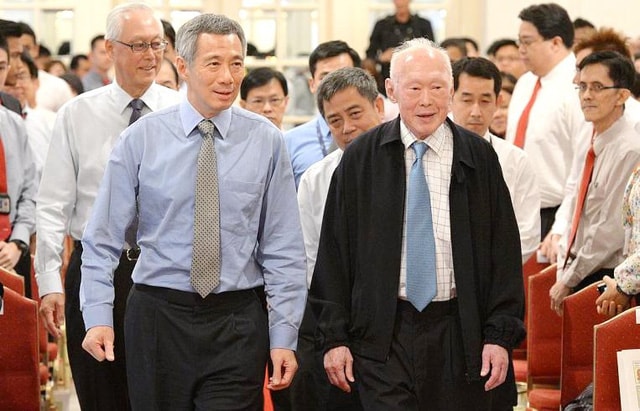Choosing a Singapore-style leader: “The Lee Kuan Yew method”
In Singapore, the People's Action Party (PAP) has been in power for 51 years and will remain so for at least the next 10 years. The question of Prime Minister Lee Hsien Loong's successor is being thoroughly discussed.

Prime Minister Lee Hsien Loong (left, front row), his father - former Prime Minister Lee Kuan Yew and Senior Minister Goh Chok Tong (behind Prime Minister Lee) at the Istana in 2012. Photo: AFP
Since the early 1970s, founding father Lee Kuan Yew has been looking for a new generation of leaders to replace his team to lead the PAP and steer the country. The “Lee Kuan Yew Method” was to scour the country for capable leaders from various fields, who were recognized for their intelligence and outstanding management skills.
In addition to those criteria, most importantly, Mr. Ly wanted to ensure that all those recommended had good character.
Strict candidate selection
Prime Minister Lee Hsien Loong is now simply inheriting what his father left behind. Today, the selection process begins with identifying good leaders through recommendations from certain leaders - people Lee Hsien Loong believes have a good eye for people.
About two years before the next election, the screening process continues with several rounds of intense interviews, during which the candidate is surrounded by several evaluation panels. These panels are divided into tiers, and each time a candidate enters a new round of interviews, he or she will have to face more senior figures than the last time and of course, will be "scrutinized" even more intensely.
Once the PAP has selected a candidate it likes, the job is not over. He or she will be tested on whether he or she can work with the grassroots leaders in the areas where he or she plans to run. This test is important because a candidate can only win an election if he or she has the support of community leaders and must demonstrate enough charisma, determination and hard work to win over voters. Regardless of a candidate’s background, there is no hope of political succession if he or she fails to win an election to become an MP, as all government leaders must be members of parliament.
In addition to the technocratic criteria, as Singapore is a multi-ethnic and multi-religious society, leaders who are capable of leading different communities, ethnic groups or religions are also selected. Of course, the Singapore Government will give priority to choosing someone who is both an ethnic minority and has leadership skills in a certain field.
Candidate trainingleader
Once candidates have become MPs, the process of screening continues to isolate a small group capable of holding major responsibilities. The PAP government often selects those with the highest potential for ministerial positions, and each of them is rotated through various areas for a short period of time.
Similarly, those identified as capable deputy ministers are appointed, but rotation occurs less frequently. They can still be promoted to ministerial positions if their performance exceeds expectations. At this stage, a leadership group for the next generation gradually forms, and a top leader (who may become prime minister) usually emerges from the first group.
During the rotation, some ministers may be judged unable to handle the prime minister's work and will not be promoted further, while some deputy ministers will rise through the ranks thanks to their diligence and good performance.
PAP policy stipulates that all senior ministers who reach old age must automatically step down, making way for younger faces. Usually, the PAP secretary-general will be the last leader of the previous generation to retire.
Once a new PAP leader has been chosen, the predecessor must hand over the prime minister's seat, retaining no power except for a little influence in the form of sharing experience, or international connections that the "old man" has accumulated over many years.
The PAP believes that the prime minister or minister does not necessarily have to be the most senior, so it is very common to see a top commander much younger than his or her subordinate. Ideally, according to the PAP, a prime minister should lead the country for at least two terms.
With each election cycle being 4-5 years apart and 60 years old being considered "a bit old" in Singapore, normally a prime minister candidate must be relatively young, between 35-40 when becoming a minister and if he is lucky enough to meet expectations, he will become the top leader before the age of 55 or even earlier.
Like many political parties around the world, the PAP’s succession is decided by consensus among senior members of the Central Committee, but Singapore is unique in that its leadership candidates are trying to prove themselves, not compete for the prime minister’s seat. Of course, there are exceptions to this, and some critics would disagree.
3 groups of candidates
Candidates selected to run for election are divided into three categories, depending on the assessment of the PAP leadership: (1) Category 1: Those with the potential to become ministers or even prime ministers; (2) Category 2: Those with the ability or potential to hold positions at the deputy minister level; (3) Category 3: Those who can become MPs, be capable of taking on the responsibility of heading a parliamentary committee, or even climb to the deputy minister and minister level in the future depending on performance.

